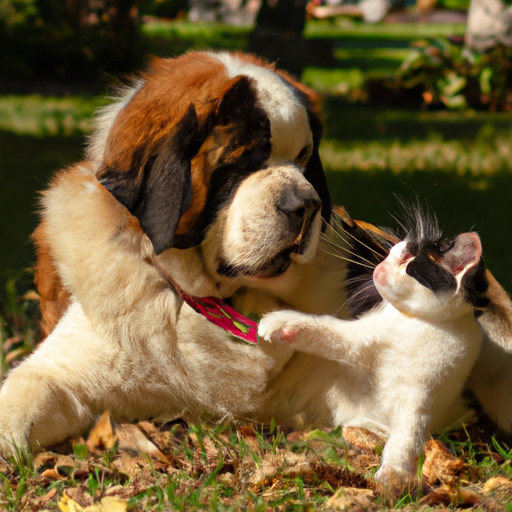In the world of canines, you’ve probably noticed a peculiar trend. Despite their size, many big dogs exude a calm, gentle demeanor, which seems paradoxical considering their stature. You might have wondered, “Why are big dogs so gentle?” Let’s dive into this fascinating topic, exploring the reasons behind their gentle behavior, and the role you play in shaping their personalities.
1. The Biology of Big Dogs
Gentleness in large dog breeds is not a mere coincidence, but a result of their inherent biological characteristics.
Energy Levels and Metabolism
Big dogs have lower energy levels as compared to their smaller counterparts. Their metabolism is slower, which means they don’t burn energy as quickly. This results in a calmer, more laid-back demeanor.
Growth and Development
Large dogs take longer to reach maturity. This extended puppyhood often results in a more relaxed adult dog who has had ample time to learn and adapt to their environment.
Genetic Predisposition
Many large breeds were selectively bred for specific purposes such as guarding, herding, or companionship, where a calm, gentle demeanor is beneficial. This selective breeding has ingrained these traits into their genetic makeup over generations.
2. The Role of Training and Socialization
Your role as a caregiver is paramount in shaping a dog’s behavior and temperament. Proper training and socialization can help enhance the gentle nature of big dogs.
Training
Big dogs need to be well-trained from a young age to prevent any behavioral problems. They are often easier to train due to their desire to please their owners and their ability to focus for longer periods.
Socialization
Exposing your dog to different environments, people, and other animals from a young age helps them to be more adaptable and less likely to react negatively or aggressively.
3. The Influence of Environment
The environment in which a dog is raised significantly impacts their behavior.
Home Environment
A calm and stable home environment contributes to a dog’s gentle nature. If a dog feels safe and secure, they’re less likely to display aggressive or anxious behaviors.
Interaction with Owners
The way you interact with your dog plays a significant role in their behavior. Positive reinforcement, consistency, and patience can enhance your dog’s gentle behavior.
4. Common Misconceptions about Big Dogs
Despite their gentle nature, big dogs often fall victim to stereotypes and misconceptions. It’s essential to debunk these myths for a better understanding of their behavior.
| Misconception | Reality |
|---|---|
| Big dogs are dangerous | With proper training and socialization, big dogs are no more dangerous than smaller ones. |
| Big dogs are aggressive | Aggression is not size-dependent. It varies based on individual temperament, training, and socialization. |
| Big dogs are difficult to manage | Although they require more space and food, big dogs are often easier to train and handle due to their calm demeanor. |
5. FAQ’s
Why are my big dog’s energy levels lower?
Big dogs have a slower metabolism compared to small dogs. This causes them to be less hyperactive and more relaxed.
Are all big dogs gentle?
Not all big dogs are gentle. A dog’s temperament depends on their genetic predisposition, training, socialization, and environment.
How can I ensure my big dog remains gentle?
Proper training, early socialization, a calm home environment, and positive interactions with your dog can help maintain their gentle nature.
Are big dogs good for families?
Yes, big dogs, due to their gentle and protective nature, can make excellent family pets. They are often great with children and can be protective of their family.
Are big dogs harder to train?
Not necessarily. Big dogs have a strong desire to please their owners and can focus for a longer time, making them quite trainable.
In conclusion, the gentleness of big dogs can be attributed to their biology, training, socialization, and environment. As a caregiver, your role is invaluable in nurturing their gentle behavior. So, the next time someone asks, “Why are big dogs so gentle?” you’ll have the perfect answer!



